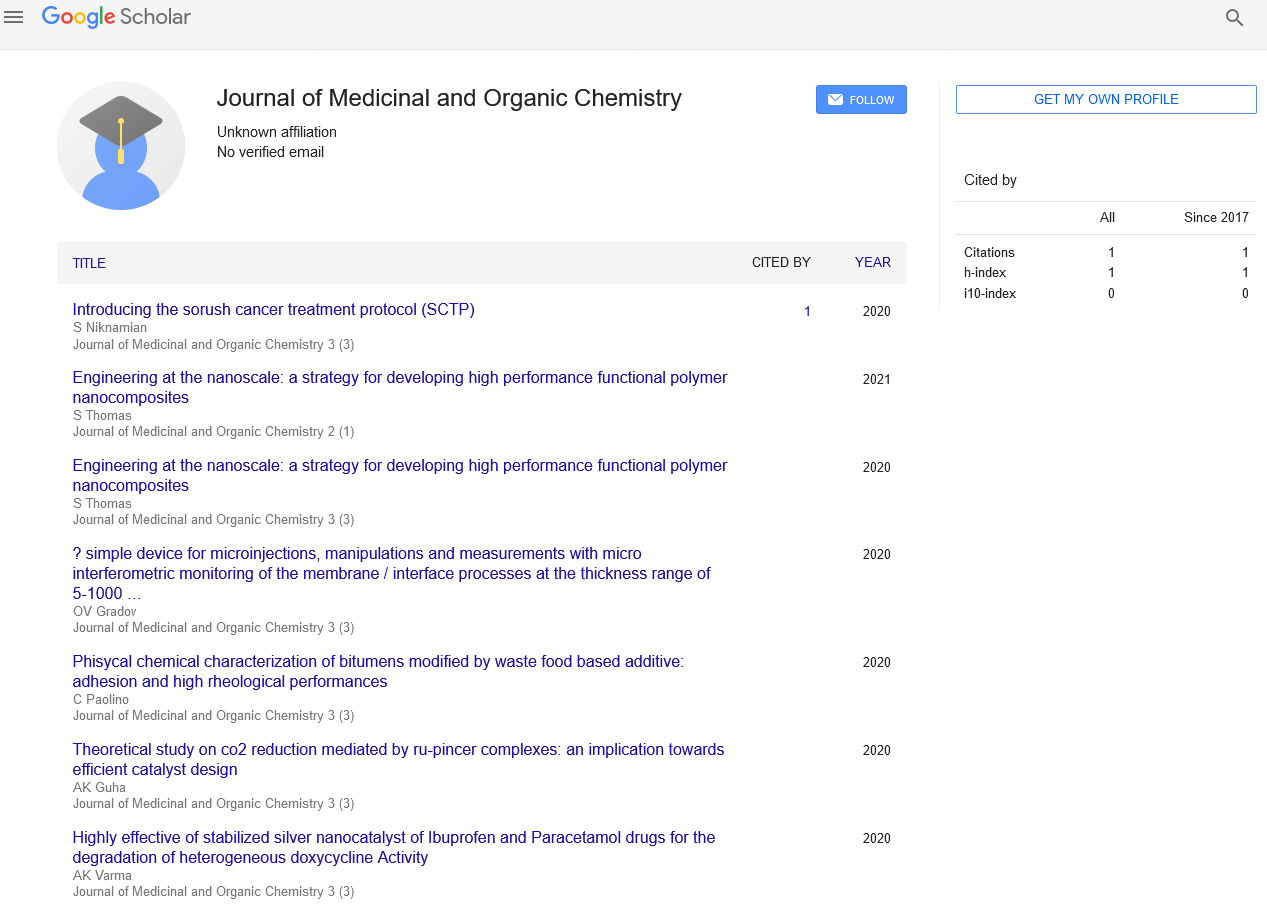Perspective - Journal of Medicinal and Organic Chemistry (2024) Volume 7, Issue 1
Unraveling the Human Experience: The Intersection of Psychology and Social Science Research
- Corresponding Author:
- Roya Barak
Department of Nutritional Science,
University of Gehran,
Isfahan,
Iran
E-mail: barakroya@sumac.ac.ir
Received: 25-Jan-2024, Manuscript No. jmoc-24-126338; Editor assigned: 30-Jan-2024, PreQC No. jmoc-24-126338 (PQ); Reviewed: 13-Feb-2024, QC No. jmoc-24-126338; Revised: 22-Feb-2024, Manuscript No. jmoc-24-126338 (R); Published: 29-Feb-2024, DOI: 10.37532/jmoc.2024.7(1).167-168
Introduction
Psychosocial research delves into the intricate interplay between individual psychology and social contexts, shedding light on the multifaceted dynamics that shape human behavior, relationships and well-being. From understanding the influence of social factors on mental health to examining the psychological mechanisms underlying societal phenomena, psychosocial research offers invaluable insights into the human experience. In this expansive exploration, we delve into the fundamental principles, methodological approaches and transformative implications of psychosocial research on individual and collective flourishing.
Description
Fundamental principles of psychosocial research
At the heart of psychosocial research lies the recognition that human behavior and experiences are shaped by both individual psychological processes and social environments. This interdisciplinary field draws upon theories and methodologies from psychology, sociology, anthropology and related disciplines to investigate the reciprocal interactions between individual cognition, emotions and behaviors and broader social structures, norms and institutions. By elucidating these dynamic interconnections, psychosocial research seeks to unravel the complexities of human behavior and promote holistic understanding and intervention.
Social determinants of health
Psychosocial research illuminates the role of social determinants in shaping health outcomes and health disparities across diverse populations. Factors such as socioeconomic status, education, employment, access to healthcare and social support networks exert profound influences on individual health behaviors, access to healthcare services and susceptibility to chronic diseases. By addressing social determinants of health through policy interventions, community-based programs and advocacy efforts, psychosocial research contributes to advancing health equity and reducing disparities in health outcomes.
Psychological resilience and coping
Psychosocial research explores the psychological processes underlying resilience, adaptation and coping in the face of adversity and stress. Resilience, the ability to bounce back from challenges and adversity, is influenced by individual characteristics such as self-efficacy, optimism and social support, as well as external factors such as community resources and environmental conditions. By understanding the protective factors and mechanisms that promote resilience, psychosocial research informs the development of interventions to enhance individuals’ capacity to cope with life’s challenges and thrive in the face of adversity.
Social influence and group dynamics
Psychosocial research investigates the dynamics of social influence, conformity and group behavior, shedding light on how individuals’ attitudes, beliefs and behaviors are shaped by social contexts and interpersonal relationships. Social influence processes such as conformity, obedience and persuasion play pivotal roles in shaping group dynamics, collective decision-making and social cohesion. By examining the mechanisms underlying social influence, psychosocial research informs strategies for fostering positive social norms, promoting prosocial behavior and mitigating the impact of negative peer pressure.
Cultural psychology and cross-cultural research
Psychosocial research embraces cultural diversity and examines how cultural values, beliefs and practices influence individual psychology and behavior. Cultural psychologists explore the dynamic interplay between culture and cognition, examining how cultural schemas, worldviews and social norms shape perceptions, emotions and social interactions. Cross-cultural research compares psychological phenomena across different cultural contexts, revealing both universal principles of human behavior and cultural variations in psychological processes and outcomes.
Stigma, discrimination and social exclusion
Psychosocial research confronts the pervasive issues of stigma, discrimination and social exclusion that undermine individual well-being and perpetuate social inequalities. Stigmatized identities based on race, ethnicity, gender, sexual orientation, disability or mental illness can lead to social rejection, prejudice and discrimination, exacerbating psychological distress and impairing social integration. By addressing stigma and discrimination through education, advocacy and policy interventions, psychosocial research aims to promote inclusivity, social justice and equitable opportunities for all individuals.
Community engagement and participatory research
Psychosocial research values community engagement and participatory approaches that empower individuals and communities to actively contribute to research design, implementation and dissemination. Participatory research partnerships foster collaborative relationships between researchers and community stakeholders, ensuring that research priorities, methods and outcomes are aligned with community needs and priorities. By centering community voices and perspectives, psychosocial research promotes ethical practice, cultural humility and meaningful impact in addressing complex social issues.
Conclusion
Psychosocial research serves as a catalyst for understanding the intricate interplay between individual psychology and social contexts, offering insights into the multifaceted dynamics that shape human behavior, relationships and well-being. By embracing interdisciplinary approaches, methodological rigor and community engagement, psychosocial research contributes to advancing knowledge, promoting social justice and enhancing individual and collective flourishing. As we continue to unravel the complexities of the human experience, let us harness the transformative power of psychosocial research to create a more compassionate, equitable and inclusive society for all.

